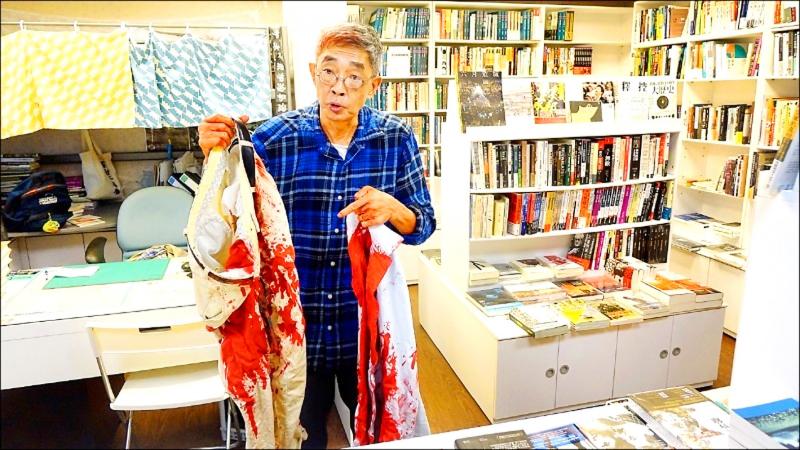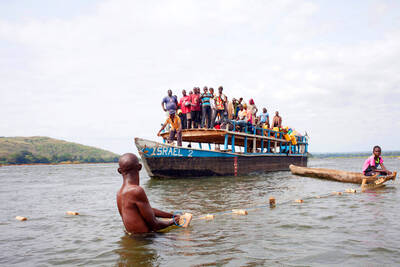Lam Wing-kee (林榮基) leaned forward in his chair, answering quickly and sharply to issue a warning to the people of his new home, Taiwan.
“Be ready now,” Lam said.
“We should be more alert as citizens, we should get ready,” the 64-year-old Hong Konger said. “If they can take Hong Kong back, the next place, I feel, is Taiwan.”

Photo: George Tsorng, Taipei Times
Late in Taipei at Causeway Bay Books Mark II, on the 10th floor of a nondescript building, Lam, a wiry, gray-haired bookseller, was sitting at his desk with a bemused gaze behind thin oval glasses.
The desk was neat, but crowded with books and a cash register, with revolutionary banners pinned to the front and mementos entombed under its glass top. Behind him was the single bunk bed where he sleeps.
The shop is crammed with shelves of books on history, culture, economics and politics — primarily Chinese, but there are also books on Russian royal family the Romanovs, Russian President Vladimir Putin and former US National Security Agency employee and whistle-blower Edward Snowden, as well as books by political theorist Hannah Arendt.
Near the front door are children’s books, including several Winnie-the-Pooh stories — a sly dig at Chinese President Xi Jinping (習近平) perhaps.
Facing them is a makeshift Lennon wall of Post-it notes, a now-illegal symbol of the Hong Kong pro-democracy protests.
Lam and his live-in bookshop are both exiles. The bookseller fled Hong Kong to Taiwan last year, reopening Causeway Bay Books to sell a dissident’s education on how and why the Chinese Communist party (CCP) launched its unprecedented crackdown on the previously semi-autonomous territory and accelerated its takeover by decades.
Taiwan must heed Hong Kong’s cautionary tale, he said.
Lam had spent decades selling critical, political and gossipy titles banned by the CCP before he and four others were disappeared from various locations in Hong Kong, China and Thailand, re-emerging in Chinese detention.
Lam has said he was grabbed by agents while crossing the Chinese border at Shenzhen with a batch of books for distribution in the mainland.
“I never understood why this thing happened, but I understood I could be a threat to the Chinese government,” he said. “I’d shipped many different books, including those that were banned and others just not considered good, because I thought it was important for people in China to know exactly what was going on.”
He was held for five months in Ningbo, where he taped a false confession for broadcast, and then was transferred to Guangdong Province.
He relates to the group known as the “Hong Kong 12,” young democracy advocates languishing in Chinese prisons after they were arrested trying to reach Taiwan by boat.
“You can’t compare custody in Hong Kong to custody in China,” Lam said. “I was really scared in custody.”
He tapped the side of his head.
“It was mental pressure, not physical damage,” he said.
Lam was allowed back to the territory briefly, where he skipped bail and stayed, telling his fellow Hong Kongers that what happened to him could happen to them. In many ways that has come true quicker than he anticipated.
Lam left the territory fearing he was high on the wanted list should the Hong Kong government pass its proposed extradition bill. The bill drew millions to the streets in protest and was eventually withdrawn, but too late to stop the momentum of the pro-democracy movement.
Beijing responded to the mass protests with a sweeping National Security Law that it claimed had global jurisdiction.
The scope of the law shocked even the most cynical observers and accelerated a crackdown in Hong Kong on even the most benign forms of dissent — including books — and the mass arrests of pro-democracy advocates and politicians.
Half a dozen items within Lam’s reach would have him jailed.
“I was a little surprised by the sudden change in Hong Kong,” Lam said. “You can simplify everything and just say China is totalitarian, but there are a lot of reasons behind it. The first question we should ask, though, is: ‘One country, two systems’ still had 27 years until the end, so why did they decide to end it now?”
He sits forward and grabs a CCP-banned book on the history of the Chinese government. It is important for people to read such works to understand what is happening and why, he said.
“We need to go back to the political climate changing in China, not in Hong Kong,” said Lam, pointing at the cover. “Who holds the power? Mr Xi Jinping. He’s like an emperor. He’s 67 years old. If he waits another 27 years [for Hong Kong to return] how old will he be? Will he still have power? Will he still be in good health?”
Over the past 18 months, while Hong Kong was being brutally crushed, pressure also increased across the Taiwan Strait.
Lam moved to Taiwan because of its thriving democracy, where free speech and political differences are allowed, and recreated Causeway Bay Books with the blessing of President Tsai Ing-wen (蔡英文).
Lam has concerns about the readiness of military and the cultural influence of China on the young people of Taiwan. He tries to talk to those who come into his shop or whom he sees at universities.
He recently held a screening for students of Ten Years, a 2015 Hong Kong movie that was supposed to be a dystopian imagining of political suppression 10 years in the future, only for much of it to become reality in five.
He has also hosted an online book club discussing activism and opposition in Hong Kong, and Taiwan, to encourage a deeper understanding of the political forces and culture behind China’s aggression.
When Lam left Hong Kong, he was accompanied to the airport by pro-democracy then-Hong Kong legislator Claudia Mo (毛孟靜).
Mo said it was clear at the time that Lam had no choice but to leave and cut off his local friends in a probable effort to protect them.
Lam later confirmed that he has the telephone numbers for the three other booksellers who have been released, but fears that to contact them would only get them in trouble.
“He is a lone wolf, a fighter, but also a sentimental person who would however prefer to put on a poker face to hide his feelings,” Mo said of Lam.
Lam said that he no longer sees a future for Hong Kong as it once was.
He has hope, but says that he must be realistic and quotes a Bible passage: “And now these three remain: faith, hope and love. But the greatest of these is love.”
He looks now at the threat to his new home.
“For Taiwan it depends on the people here, how they defy it,” Lam said. “We have guns and cannons. What did Hong Kong have?”

‘IN A DIFFERENT PLACE’: The envoy first visited Shanghai, where he attended a Chinese basketball playoff match, and is to meet top officials in Beijing tomorrow US Secretary of State Antony Blinken yesterday arrived in China on his second visit in a year as the US ramps up pressure on its rival over its support for Russia while also seeking to manage tensions with Beijing. The US diplomat tomorrow is to meet China’s top brass in Beijing, where he is also expected to plead for restraint as Taiwan inaugurates president-elect William Lai (賴清德), and to raise US concerns on Chinese trade practices. However, Blinken is also seeking to stabilize ties, with tensions between the world’s two largest economies easing since his previous visit in June last year. At the

UNSETTLING IMAGES: The scene took place in front of TV crews covering the Trump trial, with a CNN anchor calling it an ‘emotional and unbelievably disturbing moment’ A man who doused himself in an accelerant and set himself on fire outside the courthouse where former US president Donald Trump is on trial has died, police said yesterday. The New York City Police Department (NYPD) said the man was declared dead by staff at an area hospital. The man was in Collect Pond Park at about 1:30pm on Friday when he took out pamphlets espousing conspiracy theories, tossed them around, then doused himself in an accelerant and set himself on fire, officials and witnesses said. A large number of police officers were nearby when it happened. Some officers and bystanders rushed

Beijing is continuing to commit genocide and crimes against humanity against Uyghurs and other Muslim minorities in its western Xinjiang province, U.S. Secretary of State Antony Blinken said in a report published on Monday, ahead of his planned visit to China this week. The State Department’s annual human rights report, which documents abuses recorded all over the world during the previous calendar year, repeated language from previous years on the treatment of Muslims in Xinjiang, but the publication raises the issue ahead of delicate talks, including on the war in Ukraine and global trade, between the top U.S. diplomat and Chinese

RIVER TRAGEDY: Local fishers and residents helped rescue people after the vessel capsized, while motorbike taxis evacuated some of the injured At least 58 people going to a funeral died after their overloaded river boat capsized in the Central African Republic’s (CAR) capital, Bangui, the head of civil protection said on Saturday. “We were able to extract 58 lifeless bodies,” Thomas Djimasse told Radio Guira. “We don’t know the total number of people who are underwater. According to witnesses and videos on social media, the wooden boat was carrying more than 300 people — some standing and others perched on wooden structures — when it sank on the Mpoko River on Friday. The vessel was heading to the funeral of a village chief in